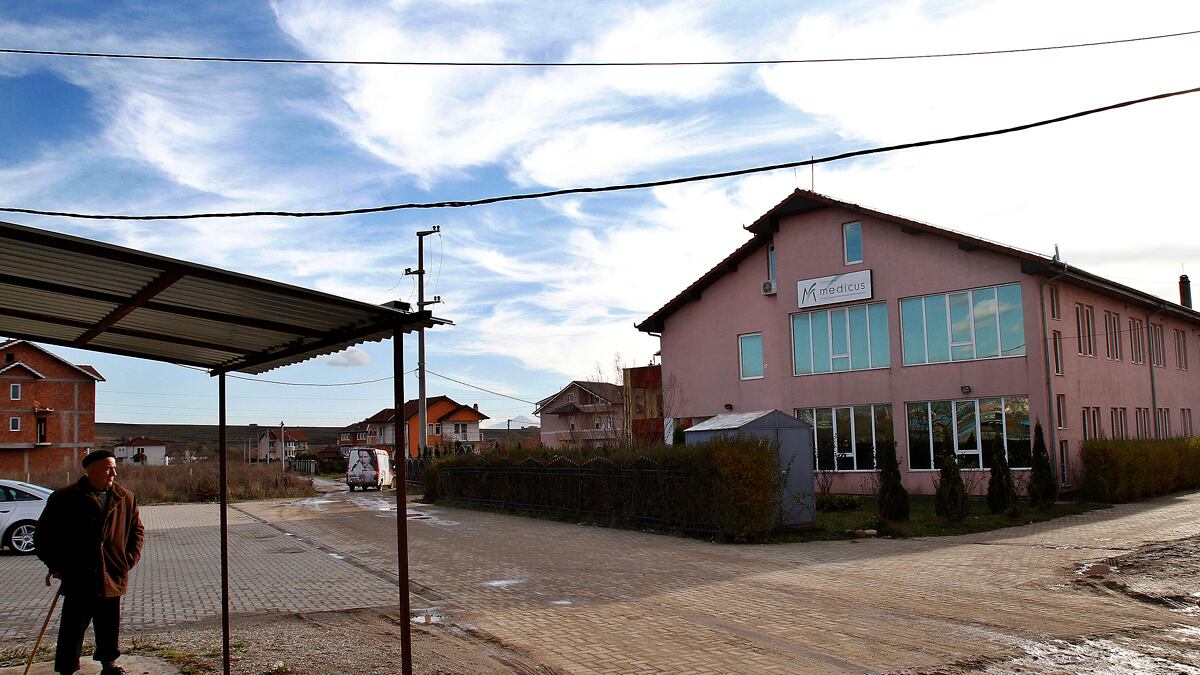Life was not going well for A.E., a 21-year-old Arab Israeli man from Kafr Manda, a poor town in northern Israel. He had only an eighth-grade education, did not speak Hebrew well, and was working as a cleaner in a chicken slaughterhouse. He wasn’t getting along with his parents. He was, in a word, vulnerable. But in April of 2007, he saw a newspaper ad in Arabic—it announced that a “Dr. Muhammed” was looking for kidney donors, and promised a “monetary prize during convalescence.” A.E. got in touch with a man named Muhammed Ben Taha Jeeth, an Arab Israeli who was not, in fact, a doctor—just a very persuasive con man. Jeeth, who had changed his name to John Allen, had a deal: $7,000 for one of A.E.’s kidneys.
A.E. moved in with John Allen and his family, and was eventually convinced to fly to the Ukraine, along with another victim, to have a kidney removed in the city of Donetsk. After the operation, A.E. was given an envelope containing only half the promised sum of money—and later, back in Israel, Allen and an accomplice deducted more expenses. A.E.’s final payment: $500. Kicked out of Allen’s house, A.E. moved back home, where he received threats and was told not to go to the authorities. Too scared to seek proper medical care, he removed his own sutures with a household knife.
The case first came to the attention of authorities when the second victim, who also had a kidney removed in the Ukraine, went to the police, leading them to A.E. In a 2007 trial in Israel, both Allen and an accomplice were found guilty of human trafficking for organ removal. And while Allen’s organ ring was particularly heartless in its pursuit of donors, it is hardly the only trafficking network to come out of in Israel in recent years. An ongoing trial in Kosovo has charged seven Kosovars, affiliated with a facility called the Medicus Clinic, with human trafficking, organized crime, and other offenses. The catalyst for the case happened in November of 2008, when authorities raided the clinic and discovered an elderly Israeli man recovering from kidney transplant surgery there. He’d paid 90,000 euros for the organ, according to an indictment. The alleged donor, a Turkish man in his twenties named Yilman Altun, had been promised $20,000 for the kidney. Altun never received the money, and has since disappeared.
Organ recipients in the Medicus case came from Israel and other Western countries such as Canada, the U.S. and Germany, according to Jonathan Ratel, the E.U. special prosecutor for the case in Kosovo. One alleged coconspirator, wanted by Interpol, is an Israeli named Moshe Harel. Harel, an alleged broker or fixer in the Medicus case, was described by Ratel in his opening statements as the “key financial mind” of the criminal organization responsible for the Medicus organ trafficking ring. (Another alleged coconspirator is a Turkish surgeon named Yusuf Sonmez.)

And a current trial in Israel shows that, in one instance, organ trafficking involving Israelis reached American shores: A man named Sammy Shem-Tov, a retired employee of Hadassah Ein Kerem Hospital in Jerusalem, stands accused of extortion and of being a kidney broker. (An Israeli lawyer says that Shem-Tov, who plead not guilty, was recently rearrested after he broke his house arrest.) The reported connection to America comes from a Brooklyn man named Levy-Izhak Rosenbaum—allegedly an associate of Shem-Tov—who pled guilty this October in a New Jersey court to brokering organ deals for three Americans with donors in Israel.
Of course, Israel is hardly the only country whose citizens go abroad to seek organ transplants—it’s a problem for many wealthy nations, including Britain, Australia, the U.S., Japan, South Korea and the United Arab Emirates. Patients generally head to a poorer part of the world—China, Eastern Europe, Colombia, the Philippines, to name a few—in order to circumvent long donor lists at home. Yet while there are no available statistics that give concrete numbers on the black market of international transplant tourism, medical watchdogs say that Israelis have popped up in organ trafficking cases over the past decade with surprising frequency, particularly given the country’s small size and its level of development—although experts also note that the country has made big gains in eradicating the practice in recent years.
“Israel is not alone in this issue” of transplant tourism, says Jeremy Chapman, a recent president of the Transplantation Society, who added that when it comes to Israel, one “apparent difference,” has been “brokerage on the push side”—that is, brokerage in Israel for those who needed transplants. “I hope that it will be a thing of the past. The situation in Israel has undoubtedly moved dramatically for the better.”
Perhaps the most important step in improving Israel’s organ problem was the country’s 2008 Organ Transplant Act, which regulated domestic transplants and made it explicitly illegal for Israelis to buy or sell organs. The law also dictated that transplants outside Israel must be conducted according to the laws of the host country, in addition to complying with Israeli law, and that insurance companies can only reimburse for operations done in the boundaries of this law.
“Up to 2008, many Israelis went to China,” says Dr. Jacob Lavee, director of the heart transplant unit at the Sheba Medical Center near Tel Aviv. “The Israelis were not the only transplant tourists who went to China—there were American and mostly European patients who went to China too—but the Israeli patients in China seeking organ transplant were the only ones, or almost the only ones, who brought with them money not out of their own pocket but from the money that came from the insurance company, or the HMOs, which made the presentation as if Israel endorses the crime against humanity that was going on in China.” The practice has now stopped, Lavee says.
At the heart of the issue has been a relatively low availability of kidneys for transplant in Israel. According to data assembled by the World Health Organization, ranking countries by the number of kidney transplantations per million population, Israel falls towards the middle of the pack, sandwiched between Colombia and Saudi Arabia, as of 2010. But considering Israel’s high placement on the Human Development Index and its reputation for excellent medical care, it ranks low, with fewer than 20 kidney transplants per million people in Israel in 2010. Only 12 percent or so of its adult population has signed organ donor cards. “You would expect Israel to be way better,” considering its level of advancement, says Dr. Luc Noel, coordinator of the clinical procedures team at the WHO, who added that Israel has improved.
A critical statistic in transplants is the consent rate: the percentage of the time when, after a relative has been declared brain dead, families agree to let the organs from the deceased person be transplanted. Historically, Israel’s consent rate is low: In 2010, the rate was 49 percent. But there is good news: that climbed to 55 percent in 2011. (That compares to an average consent rate in the United States of about 75 percent, based off the most recent data.)
The main reason for Israel’s low consent rate, says Lavee, “is the false belief that Judaism is against organ donation—a belief held by only a fraction, a small minority, of ultra-orthodox rabbis who do not believe in brain death,” and thus believe that the only way to die is through cardiac arrest. “Most of the mainstream rabbis, including the Chief Rabbinate of Israel, are absolutely for it, and are very vocal for it.”
One Israeli woman who went abroad for transplantation, and who asked to remain anonymous, shared her story with The Daily Beast. She had been born with just one kidney, and in 2001, she noticed bubbles in her urine, a sign of kidney failure. Medications and vitamins helped for some time. But a few years ago, her health took a critical turn downwards. In the end, she had the procedure done abroad, traveling overseas with a donor, a relative not related by blood whom she says donated the kidney without payment. The cost for the entire procedure: $28,000. She emphasizes how frightening the experience was, and also that the regulations in the country she went to were “more lenient for foreigners.”
“We are dealing with quite a moral issue,” says an Israeli lawyer who has worked on an organ trafficking case. “On one hand, you still have to think about those people who are sick, and it’s a question for them of living and dying, and this is why they have to travel abroad.”
But the most innovative aspect of Israel’s 2008 law is a clause guaranteeing that organ donors get preferential rankings if they should ever need a transplant themselves—an idea that encourages people to be willing to give if they are willing to receive. The new system, spearheaded by Lavee, was scheduled to go into effect on January 1, 2012, but due to overwhelming demand, the deadline for people to register was extended to March 31. The director of Israel’s National Transplant Center, Dr. Tamar Ashkenazi, says that her office saw a huge increase in activity for people who wanted to register to become donors. In a normal month, she says, there are about 3,000 to 5,000 people who want to register; in December 2011, before the deadline, her office handled more than 40,000 people who wanted to register. Lavee credits an ongoing public campaign with the reason the consent rate has improved.
The organ donation rate in Israel has been getting better since the 2008 law. As of January 1, 2012, there were 729 candidates on the list in Israel for kidney transplantation, a tiny decrease from the previous year. The year 2011 was a comparatively good one for kidney transplants in Israel, with 123 transplants from diseased donors that year, compared to just 53 the year before. The average waiting time for a new kidney in Israel is now “not that different” from what it is in the U.S., says Lavee. And the 2008 law has stopped Israelis from getting compensation from insurance companies for illegal procedures done abroad. “I feel that we are on the right track,” says Lavee. “We’ve almost cracked down transplant tourism… I hope that the trend that started last year will continue to even increase during 2012, so we will finally find ourselves in one level with most other Western countries."






